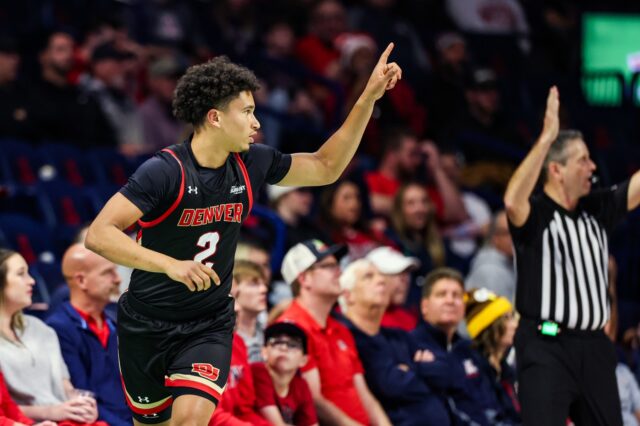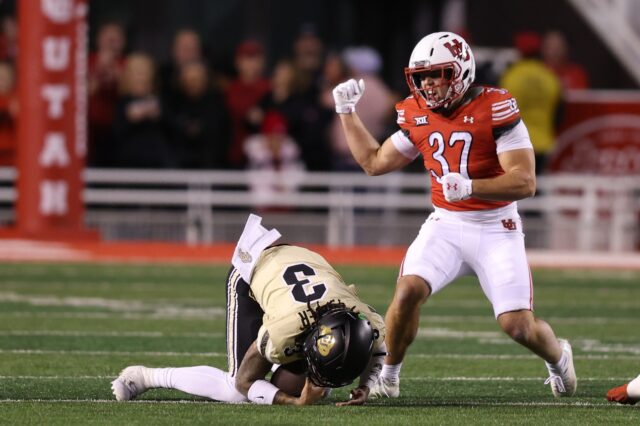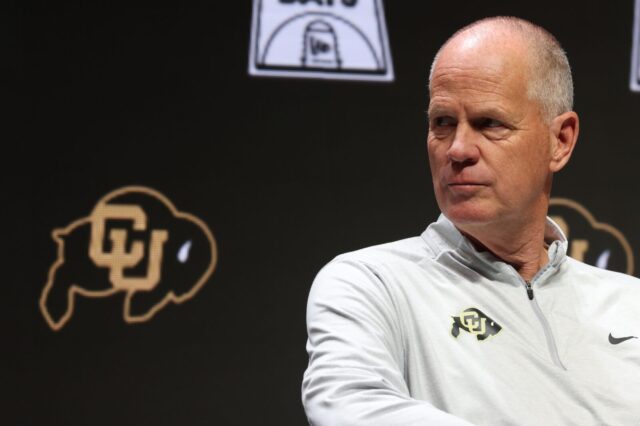This story originally appeared in Mile High Sports Magazine. Read the full digital edition.
It is not a particularly good day inside the University of Denver’s Hamilton Gymnasium. “Bad” might be a stretch – How bad could a few hours spent in the gym really be? – but it hasn’t been the men’s basketball team’s best workout. The coaches aren’t happy.
“Never, in all my years of coaching, have I seen a team that couldn’t do that,” Pioneers assistant coach Steve Snell barks. “Never.”
The Pioneers are lined up on the baseline, heads hung low.
Snell is lamenting the fact that the team had ineffectively executed a drill called “84.” The objective of 84 is simple: The team, as a group, must make 84 left-handed layups, traveling the length of the court, using just two basketballs, in two minutes. It’s a whirlwind, a non-stop, circular fast break of sorts. The first time around, the goal wasn’t met. Seventy-nine won’t do.
Tired and unsuccessful, the Pioneers line up for another crack at “84.”
“Ready…go!” yells Snell.
Rodney Billups, DU’s newest head men’s basketball coach, watches on the sideline.
“The trick is you can’t miss any shots,” he says with a smile. “Maybe one if you’re going really fast, but more than one and it’s pretty much impossible.”
“Five! Four! Three! Two! Aaaand one,” Snell counts down as the last shooters race toward the basket. The two minutes is up. Basketballs come to a stop. The Pioneers pant. “Coaches, what’cha got?”
“Forty-one,” Ricardo Patton, Billups’ first assistant, says from the west baseline.
“Forty-two,” Dan Ficke, another DU assistant, says from the east.
Eighty-three. One shy. The team looks dejected, having missed the elusive “84” twice now.
“Bring it in, fellas,” says Billups walking to the center of the floor.
“Guys, we can play Princeton. We can. I know that offense, and we can go back to it,” he says. “But when we got here, everyone was excited about playing fast. Playing fast is fun. That’s what you said; you wanted to play fast, right?
“Well, that wasn’t fast.”
Meet the new Denver Pioneers. They’re going to be fast, come hell or high water. Fast is the game Billups knows. Fast is the game that the hundreds who showed up at Billups’ introductory press conference last spring are excited to watch this season. Fast is how his players want to play.
The problem is that while first-time head coach Billups and his all-new staff know well how to play fast, most of their players never have, not at this level. In fact, plenty of them were recruited, and then trained, to play slow.
Joe Scott, DU’s coach of nine seasons before being let go last spring, played slow. After four seasons at Air Force, followed by three more at Princeton, Scott landed at Denver in 2007, and with him he brought the famed – but slow – Princeton Offense.
For a while it worked. Sort of. Scott posted five winning seasons in a row (2009-10 through 2013-14), but never in his stay at DU did he guide the Pioneers to the NCAA Tournament. Despite having a degree of success in the regular season, his teams consistently fell short in conference tournaments. When the Pioneers landed in the Summit League in 2013, a mid-major conference certainly winnable according to those who follow college hoops, Scott’s teams finished fourth, sixth and sixth over his final three years.
Not only were Scott’s teams playing slow, but they weren’t winning. Peg Bradley-Doppes, DU’s vice chancellor for athletics and recreation and RC operations, had seen enough.
Exit Scott. Enter Billups, Denver’s native son and a former Pioneer himself.
“Playing fast is going to be tough, a real challenge this year,” says Billups after practice, seated inside his corner office that still needs a few finishing touches. “But man, it’s going to be a lot of fun.
“You have to be comfortable being uncomfortable running. You’ve got to play through being tired.”
Running is what Billups has done, too. It’s been nonstop since the day he was officially hired – before, actually. While still an assistant under Tad Boyle at the University of Colorado, Billups knew the DU opportunity was a real possibility. But when Scott’s Pioneers advanced all the way to the Summit League Conference Tournament semifinals, Billups wondered if it would really happen. Scott was let go following DU’s dismissal, Billups returned from the NCAA Tournament with the Buffs on Thursday, the announcement he would be the University of Denver’s newest coach happened on Friday and the press conference took place on Monday.
Boyle’s first piece of advice to Billups was simple and to the point: “Make sure you hire your staff before the announcement comes out.”
“That was the best advice I could get,” Billups says.
When the announcement began making its way through social media and online news sources that Friday, Billups estimates he received over 350 text messages and calls. They all involved a “congratulations” of some kind, but plenty offered their services or had an idea for who might be good on Billups’ staff.
Boyle has provided whatever advice Billups has sought thus far, but all of it follows one basic rule: Follow your gut, do what’s right for you.
And that’s what Billups has done since day one. It’s his team, but he’s not shy about the fact that he’s surrounded himself with assistants who possess considerably more coaching experience.
“I learned, actually from my time at DU when I was a student, to always be the dumbest guy in the room,” he says proudly. “If you’re collecting a group of friends, try to get somebody who compensates for your weaknesses.”
He considers himself to be more of a “good cop,” while assistants Patton, who has 15 seasons of Division I experience as a head coach, including an 11-year run at the University of Colorado, and Snell, who has served as an assistant for nine different programs since 1992, are more likely to be the disciplinarians. The goal, Billups says, is to build the confidence of a group of players who have taken their fair share of lumps.
“Coach Scott was pretty intense, more of a yeller,” says Joe Rosga, who led the Pioneers in scoring (12.7 PPG) last season as a freshman. “Coach Billups doesn’t really yell. He still gets into you, but it’s different.”
“That’s one quality our staff has,” Billups says. “Patience with our guys. It’s hard on them. They didn’t get recruited to be fast.”
Aside from playing fast, Billups will slowly and surely put his stamp on the program. This season the court inside Magness Arena has been redesigned. The look and feel in the locker room has been refreshed. Next season the Pioneers will debut a new-look uniform. “In order for us to win and evolve, we have to change with the game,” he says.
Locals love the fact that Billups is a Denver kid. He came through the DPL – “He’s one of us,” they’ll often say. Billups said at his opening press conference he’ll always recruit Denver. He has relationships with many coaches he played with or against while at George Washington. He hopes to be sitting in the living rooms of preps who might be “a little too good” for DU. In the past, the program regularly sought players who would sign, rather than athletes who might not.
The Xs and Os, the recruiting, the development of players – these are all familiar to Billups, who’s been around high levels of basketball his entire life. The biggest change is that all the problems, all the decisions, all the off-court “stuff” winds up on his desk in this new role. But he’s single and this is what he does; this is all he does. This is the job. This is what he wants to be doing and where he wants to be doing it. The time and new challenges have yet to scare or rattle him.
“I’m young,” Billups, 33, laughs. “I’m macho man right now!”
Still, the task at hand might be daunting. In addition to teaching his team to play a different brand of basketball, the “results-oriented business” he’s now a part of will eventually require winning. One day in the not too distant future, wins and losses will determine whether or not Billups was the right hire. He’s confident he was.
“I really believe in this team this year. We can win 20 games,” he says. “It’s just trying to get them to play fast and think fast and learn fast. It’s going a process, but it’s fun though.
“You’ll see when you come to the games.”



